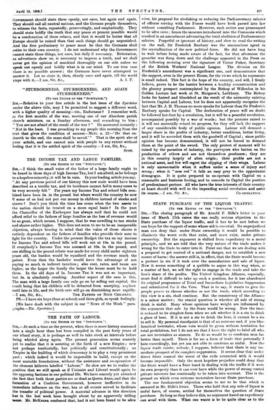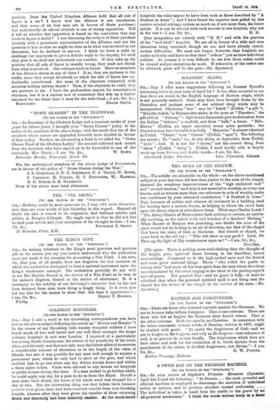STATE PURCHASE OF THE LIQUOR TRAFFIC. [TO TER EDITOR OF
TEl " SPECTATOR."1
Szn,—The closing paragraph of Mr. Arnold F. Hills's letter in your issue of March 25th raises the one really serious objection to the State purchase of the liquor traffic, and it has to be met before we can hope for the support of some whose aid is essential. No unprejudiced man can deny that under State ownership it would be possible to eliminate the worst evils that exist, and must exist, under private ownership. But the argument is shifted from expediency to a moral principle, and we are told that the very nature of the trade makes it wrong for the State to enter into it. Point out that we are dealing with a proposal to get control of a national danger, not to establish a new source of harm: the answer still is, in effect, that the State would become a partner in sin if it took over the manufacture and sale of liquor. Now it seems something of a quibble to argue in this way when, as a matter of fact, we sell the right to engage in the trade and take the lion's share of the profits. The United Kingdom Alliance, especially, must find it difficult to take up such a position, for it has abandoned its original programme of Total and Immediate Legislative Suppression and substituted for it the Veto. That is to say, it wants to give the people power to choose whether or not the trade, which according to this view is a sin, shall continue. But the consistency of the Alliance is a minor matter ; the crucial question is whether all sale of strong drink is sinful. Many whose opinions have weight are influenced by the argument that sale by the State would be wrong. Now the issue is reduced to its simplest form when we ask whether it is a sin to drink a glass of beer. If it is not a sin to drink the beer, it cannot be a sin
to sell it. My personal standpoint is that of an extreme and, if you like, fanatical teetotaler, whose vote would be given without hesitation for
total prohibition, but I do not see that I have the right to label all who are not teetotalers as sinners. To do so would be to condemn men far better than myself. There is for me a form of trade that personally I hate exceedingly, but yet am not able to condemn as sinful. Now the liquor trade exists ; nobody, I suppose, believes that there is any im- mediate prospect of its complete suppression. It seems clear that under direct State control the worst of the evils connected with it would become impossible. Only the most hopeless prejudice could deny that the State would have a freer hand in dealing with the traffic if it were
its own property than it can ever have while the power of strong vested private interests has continually to be taken into account. This is the ground on which even extreme teetotalers favour State purchase.
The one fundamental objection seems to me to be that which is assumed in Mr. Hills's letter. Those who hold that any sale of liquor is sinful have, of course, settled for themselves the question of State purchase. So long as they believe this, no argument based on expediency can avail with them. What one wants is to be vita clear as to the
position. Does the United Kingdom Alliance hold that all sale of liquor is a sin ? I know that the Alliance is not unanimous, and that some of its best men are in favour of State purchase ; but undoubtedly its official attitude is one of strong opposition. Will it tell us whether this opposition is based on the conviction that any trade in liquor is sinful ? I was discussing the subject of State purchase recently with a prominent representative of the Alliance, and put the question to him so that we might be clear as to what was involved in our discussion, but he declined to answer. I think we have a right to challenge our opponents to give a definite reply to the inquiry, for until they give it we shall not understand one another. If they take up the position that all sale of liquor is morally wrong, they must not shrink from what is involved. Our railways trade in liquor. Have no members of the Alliance shares in any of them ? If so, they are partners in the traffic, since they accept dividends to which the sale of liquor has un- doubtedly contributed. Are none of the objectors connected with societies holding railway shares ? Then, if the objection be valid, they are partners in sin. I have the profoundest respect for conscientious objectors, but it is a curious sort of conscience that sets up a higher standard for the State than it does for the individual.—I am, Sir, &c.,































 Previous page
Previous page